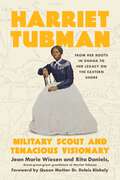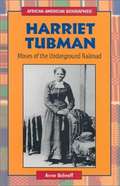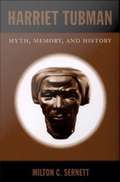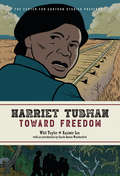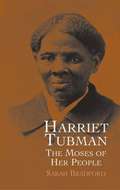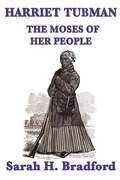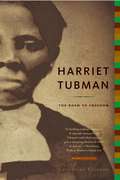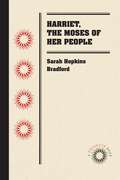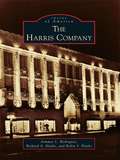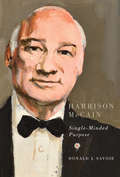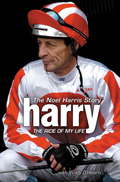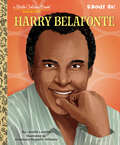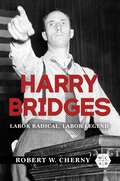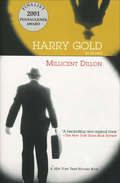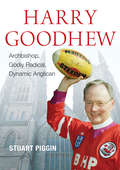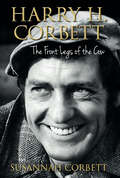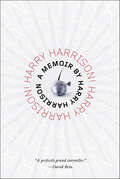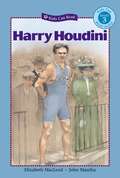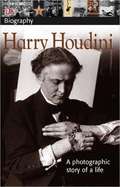- Table View
- List View
Harriet Tubman: Military Scout and Tenacious Visionary: From Her Roots in Ghana to Her Legacy on the Eastern Shore
by Jean Marie Wiesen Rita DanielsA fresh portrait of this iconic American—and the first to involve a Tubman family member since Harriet herself was interviewed in 1886.For all Harriet Tubman&’s accomplishments and the myriad books written about her, many gaps, errors, and misconceptions of her legendary life persist. One such fallacy is that Sarah H. (Hopkins) Bradford is to blame for omitted information in Harriet Tubman: The Moses of Her People and that she ended her second book too soon. But according to the Tubman family, it was Harriet&’s physical disability, the result of a head injury she incurred as a child, that left her unable to complete the necessary lengthy interview process with Sarah and properly flesh out the work. Harriet Tubman: Military Scout and Tenacious Visionary sets out to rectify these omissions and many others. As recognition and tributes to Tubman&’s remarkable contributions to American history and civil liberty continues to grow, the time is right for a new biography with the involvement of her family, who have been the caretakers and stewards of her legacy for generations. Just who was this remarkable woman? We might know the outlines of her story, but the deep research of Jean Marie Wiesen and rich family memory of Rita Daniels combine to form a nuanced and vibrant portrait of a historic figure we all thought we knew. Uncovering Harriet's ancestral roots in Ghana and exploring her time on the underground railroad, as a military scout, suffragette, and more, Harriet Tubman is an inspiring and illuminating narrative about a key figure in our history.
Harriet Tubman: Moses of the Underground Railroad
by Anne SchraffExamines the life of the person who helped many people escape through the Underground Railroad during the Civil War.
Harriet Tubman: Myth, Memory, and History
by Milton C. SernettHarriet Tubman is one of America's most beloved historical figures, revered alongside luminaries including Abraham Lincoln and Frederick Douglass. Harriet Tubman: Myth, Memory, and History tells the fascinating story of Tubman's life as an American icon. The distinguished historian Milton C. Sernett compares the larger-than-life symbolic Tubman with the actual "historical" Tubman. He does so not to diminish Tubman's achievements but rather to explore the interplay of history and myth in our national consciousness. Analyzing how the Tubman icon has changed over time, Sernett shows that the various constructions of the "Black Moses" reveal as much about their creators as they do about Tubman herself. Three biographies of Harriet Tubman were published within months of each other in 2003-04; they were the first book-length studies of the "Queen of the Underground Railroad" to appear in almost sixty years. Sernett examines the accuracy and reception of these three books as well as two earlier biographies first published in 1869 and 1943. He finds that the three recent studies come closer to capturing the "real" Tubman than did the earlier two. Arguing that the mythical Tubman is most clearly enshrined in stories told to and written for children, Sernett scrutinizes visual and textual representations of "Aunt Harriet" in children's literature. He looks at how Tubman has been portrayed in film, painting, music, and theater; in her Maryland birthplace; in Auburn, New York, where she lived out her final years; and in the naming of schools, streets, and other public venues. He also investigates how the legendary Tubman was embraced and represented by different groups during her lifetime and at her death in 1913. Ultimately, Sernett contends that Harriet Tubman may be America's most malleable and resilient icon.
Harriet Tubman: The Center for Cartoon Studies Presents (The Center for Cartoon Studies Presents)
by Whit TaylorThis illuminating graphic novel biography about Harriet Tubman sheds new light on one of American history's bravest heroes.Harriet Tubman did something exceptionally courageous: She escaped slavery. Then she did something impossible: She went back. She underwent some thirteen missions to rescue around seventy enslaved people, using and expanding a network of abolitionists that became known as the Underground Railroad. She spent her life as an activist, speaking out for Black people and women's suffrage. This modern account of her trip to save her brothers is detailed and authentic. Illustrated with care for the historical record, it offers insight into the life and mind of Tubman, displaying her as a woman with an unshakable desire to break the chains of an unjust society. It is a perfect anti-racist narrative for our times and deepens an understanding of just what freedom means to those who must fight for it.
Harriet Tubman: The Moses of Her People
by Sarah H. BradfordThis memorable biography is about Harriet Tubman, a former slave who led a heroic struggle more bravely and more successfully than any other to liberate African-Americans from slavery.
Harriet Tubman: The Moses of her People
by Sarah H. BradfordAfter reaching Philadelphia, Tubman began thinking of her family. "I was a stranger in a strange land," she said later. "My father, my mother, my brothers and sisters, and friends were in Maryland. But I was free, and they should be free." For 11 years Tubman returned again and again to the Eastern Shore of Maryland, rescuing some 70 slaves in 13 expeditions, including her three other brothers, Henry, Ben, and Robert, their wives, and some of their children. She also provided specific instructions for about 50 to 60 other fugitives who escaped to the north.
Harriet Tubman: The Road to Freedom
by Catherine ClintonEvery schoolchild knows of Harriet Tubman's heroic escape and resistance to slavery.But few readers are aware that Tubman went on to be a scout, a spy, and a nurse for the Union Army, because there has never before been a serious biography for an adult audience of this important woman.This is that long overdue historical work, written by an acclaimed historian of the antebellum era and the Civil War. Illiterate but deeply religious, Tubman left her family in her early 20s to escape to Philadelphia, then a hotbed of abolitionism.There she became the first and only woman, fugitive slave, and black to work as a conductor on the Underground Railroad. So successful was she in spiriting away slaves that the state of Maryland put a $40,000 bounty on her head.Within a year of starting her work, fellow slaves and Northerners began referring to Tubman as 'Moses' because of how many people she had freed. With impeccable scholarship that draws on newly available sources and research into the daily lives of slaves, HARRIET TUBMAN is an enduring work on one of the most important figures in American history.
Harriet Tubman: The Road to Freedom
by Rae BainsThis book focuses on the childhood and young-adult years of Harriet Tubman and the obstacles she overcame to achieve greatness. Inspirational and informative reading for students with big dreams.
Harriet, the Moses of Her People
by Sarah Hopkins BradfordIn 1869, Sarah Hopkins Bradford published Scenes in the Life of Harriet Tubman. Though often disjointed, this account presented to the public a legendary figure of the Underground Railroad. In 1886, Bradford substantially rewrote the biography at the request of Tubman, who hoped its sales would raise enough funds for the building of a hospital for old and disabled colored people. This second edition, Harriet, the Moses of Her People, provided little new information, but arranged the jumbled narrative of Scenes in chronological order, providing a clearer account of Tubman's life.A DOCSOUTH BOOK. This collaboration between UNC Press and the University of North Carolina at Chapel Hill Library brings selected classic works from the digital library of Documenting the American South back into print. DocSouth Books uses the latest digital technologies to make these works available as downloadable e-books or print-on-demand publications. DocSouth Books are unaltered from the original publication, providing affordable and easily accessible editions to a new generation of scholars, students, and general readers.
Harris Company, The
by Aimmee L. Rodriguez Richard A. Hanks Robin S. HanksFor almost 100 years, the slogan "Harris' Has It" set a standard for quality merchandise, selection, and personal service. Starting in 1905 with only 25 feet of frontage at its original San Bernardino store, this partnership of three immigrant brothers grew into a corporation of nine stores, with the flagship store alone worth over $1 million. The Harris Company was the first in the region to enhance the shopping experience with the introduction of elevators, electric signs, and escalators. Although the store closed in 1999, the Harris Company is remembered throughout the Inland Empire as a shopping experience that was more than just business, it was "looking after people."
Harrison Ford: A Little Golden Book Biography (Little Golden Book Biographies)
by Kim OstrowGet to know Harrison Ford with this collectible Little Golden Book which tells his amazing journey from working as a carpenter to being a Hollywood star, alongside amazing full-color illustrations!Harrison decided that day to never let fear stop him from doing anything.Actor Harrison Ford has flown in a galaxy far, far away as Han Solo and has searched for lost treasures as Indiana Jones. But did you know he's just as adventurous in real life, too? Harrison flies planes and helicopters and he's passionate about protecting the environment. Harrison Ford: A Little Golden Book Biography brings his action-packed story to life. Look for more Little Golden Book biographies: • Steven Spielberg • Billy Porter • Barbra Streisand • Steve Martin • William Shatner
Harrison McCain
by Donald J. SavoieThe only rival to Harrison McCain's entrepreneurial success was his deep attachment to his Maritime roots. From McCain's beginnings in Florenceville, New Brunswick, the early mentorship he received from K.C. Irving, to the global success of his corporate empire McCain Foods, Donald Savoie presents a compelling and candid biography of one of the most famous and down-to-earth figures in Canadian business history. Savoie, a longtime friend to McCain, describes a driven, charismatic, and energetic man who had a keen wit and a deep commitment to his business and hometown. Through unprecedented access to McCain's papers and interviews with family members, friends, and colleagues, Savoie details the decisions that McCain made alongside his brother and business partner, Wallace McCain, from the company's humble beginnings to its expansion in Europe, Australia, India, and China. McCain saw the potential of globalization before others did. Despite conflict between the brothers and the eventual fracture of their partnership, Savoie presents the McCains' dedication as so immersed in the development of their company that they had little time left for second-guessing. At a time when New Brunswick struggles to reinvent itself economically, Savoie points to former government policies and programs that helped the company thrive and holds up the example of Harrison McCain with the hope of seeing Canadian success stories like this in the future.
Harrison McCain: Single-Minded Purpose (Footprints Series #17)
by Donald J. SavoieThe only rival to Harrison McCain’s entrepreneurial success was his deep attachment to his Maritime roots. From McCain’s beginnings in Florenceville, New Brunswick, the early mentorship he received from K.C. Irving, to the global success of his corporate empire McCain Foods, Donald Savoie presents a compelling and candid biography of one of the most famous and down-to-earth figures in Canadian business history. Savoie, a longtime friend to McCain, describes a driven, charismatic, and energetic man who had a keen wit and a deep commitment to his business and hometown. Through unprecedented access to McCain’s papers and interviews with family members, friends, and colleagues, Savoie details the decisions that McCain made alongside his brother and business partner, Wallace McCain, from the company’s humble beginnings to its expansion in Europe, Australia, India, and China. McCain saw the potential of globalization before others did. Despite conflict between the brothers and the eventual fracture of their partnership, Savoie presents the McCains’ dedication as so immersed in the development of their company that they had little time left for second-guessing. At a time when New Brunswick struggles to reinvent itself economically, Savoie points to former government policies and programs that helped the company thrive and holds up the example of Harrison McCain with the hope of seeing Canadian success stories like this in the future.
Harry - The Ride of My Life: The Noel Harris Story
by Wally O'HearnOne of the oldest jockeys still riding. Noel aka Handbreak Harry is the Keith Richards of the racing world. Talks of drugs, gambling and race fixing. His father is also a well known figure in the racing world. Bursting to prominence in the 1980s, Noel may 'smoke like a chimney, drink like a fish and eat like a sparrow' but he rides like a true champion. And he has outlasted many of his competitors, still leading them home in his late fifties after having notched up over 2000 wins. Along the way he has gained the loyalty of owners and trainers, the respect of fellow jockeys and the admiration of race-goers. He has also had a few beers, a bit of fun and lots of laughs, enjoying life and loving racing. Colourful - including green hair on occasions - and sometimes outlandish, Noel has stood out for his singular riding style, his optimism, commitment, sense of humour and straight-shooting sincerity. Racing is a game of wins and losses, highs and lows, and in this book, Noel takes us on the rollercoaster, from growing up in a racing family and apprenticeship days in a wild and scary Singapore, the rides and races of the NZ and Australian racing calendars, and the trials, tribulations and triumphs of staying at the top. Noel gives us the goods on the horses, owners, trainers, jockeys, races and officials, friends and family - the emotions, experiences, anecdotes and accolades of a long and successful career.
Harry Belafonte: A Little Golden Book Biography (Little Golden Book)
by Lavaille LavetteCreated in partnership with Ebony Jr., this Little Golden Book biography celebrates the life and legacy of singer, performer, and activist Harry Belafonte.When Harry Belafonte was a little boy, he moved from Harlem, New York, to live with his grandmother in Jamaica. There, Harry fell in love with Calypso music. It was the seed that blossomed into a life dedicated to inspiring people through music. This moving biography chronicles his life and career—as an actor, a singer, and a civil rights activist who has always sought to make a difference while encouraging people to treat each other with respect and kindness. Since 1945, Ebony magazine has shined a spotlight on the worlds of Black people in America and worldwide, telling their stories. Ebony Jr! was created in 1973 to give Black children a magazine that was all their own. The magazine included stories, comics, puzzles, and cartoons centering Black children. Its mission was to ignite a love of reading and a love of self in Black kids, and we&’re continuing that with our branded LGB program.
Harry Bridges: Labor Radical, Labor Legend (Working Class in American History)
by Robert W. ChernyThe iconic leader of one of America’s most powerful unions, Harry Bridges put an indelible stamp on the twentieth century labor movement. Robert Cherny’s monumental biography tells the life story of the figure who built the International Longshore and Warehouse Union (ILWU) into a labor powerhouse that still represents almost 30,000 workers. An Australian immigrant, Bridges worked the Pacific Coast docks. His militant unionism placed him at the center of the 1934 West Coast Waterfront Strike and spurred him to expand his organizing activities to warehouse laborers and Hawaiian sugar and pineapple workers. Cherny examines the overall effectiveness of Bridges as a union leader and the decisions and traits that made him effective. Cherny also details the price paid by Bridges as the US government repeatedly prosecuted him for his left-wing politics. Drawing on personal interviews with Bridges and years of exhaustive research, Harry Bridges places an extraordinary individual and the ILWU within the epic history of twentieth-century labor radicalism.
Harry Caray (Voice of the Fans)
by Pat Hughes Bruce MilesA photo and audio tribute to the legendary broadcaster Harry Caray Voice of the Fans.
Harry Dean Stanton: Hollywood's Zen Rebel (Screen Classics Ser.)
by Joseph B. AtkinsThe first biography of the man Vanity Fair described as “the philosopher poet of character acting.”After a series of minor parts in forgettable westerns, Harry Dean Stanton gradually began to get film roles that showcased his laid-back acting style, appearing in Cool Hand Luke, Kelly’s Heroes, The Godfather: Part II, and Alien. He became a headliner in the eighties?starring in Wim Wenders’s moving Paris, Texas and Alex Cox’s Repo Man?but it was his extraordinary skill as a character actor that established him as a revered cult figure and kept him in demand throughout his career.Here, Joseph B. Atkins unwinds Stanton’s enigmatic persona, shedding light on his early life in West Irvine, Kentucky, and exploring his difficult relationship with his Baptist parents, his service in the Navy, and the events that inspired him to drop out of college and pursue acting. Atkins also chronicles Stanton’s early years in California, describing how he honed his craft at the renowned Pasadena Playhouse before breaking into television and movies.In addition to examining his acclaimed body of work, Atkins explores Harry Dean Stanton as a Hollywood legend, following his years rooming with Jack Nicholson, partying with David Crosby and Mama Cass, jogging with Bob Dylan, and playing poker with John Huston. Stanton is often remembered for his crowd-pleasing roles in movies like Pretty in Pink or Escape from New York, but this impassioned biography illuminates the entirety of his incredible sixty-year career, drawing on interviews with the actor’s friends, family, and colleagues.
Harry Gold: A Novel
by Millicent DillonPEN/Faulker Award Finalist: A &“fascinating and original&” novel based on the real life of a notorious Soviet spy (The New York Times Book Review). This gripping narrative brings to life dramatic true events in America from the 1930s through the McCarthy era—taking us from Russian Jewish immigrant Harry Gold&’s recruitment by the Soviets, to his training in tradecraft, to his role in Julius Rosenberg&’s and Klaus Fuchs&’s atomic espionage at Los Alamos. The result is a novel with the psychological depth of The Third Man, the taut pacing of All the President&’s Men, and the moral poignancy of I Married a Communist—named a New York Times Notable Book of the Year. &“She has a novelist&’s feel for the telling detail . . . A compassionate, informative view of a sad, unusual life.&” —Publishers Weekly &“Dillon shows how Gold&’s hunger for human contact helps him ignore the hypocrisies and manipulations of his handlers.&” —Kirkus Reviews
Harry Goodhew: Godly Radical, Archbishop, Dynamic Anglican
by Stuart PigginWhat is the best way to make Jesus known and to make churches grow in Australia today? ‘It’s not hard,’ insists Harry Goodhew, Archbishop of Sydney from 1993 to 2001, ‘Just love people and preach the gospel.’Contrary to trends in the rest of Australia and the Christian West, churchgoing numbers in Sydney increased during his time as archbishop. The local churches he led before becoming archbishop flourished, experiencing rapid growth and warmth of fellowship. They were Christ-centred, Bible-based and well led.Are so many churches in Australia struggling because they are not well led? Is it that Harry was just exceptional? Many have thought so.Or is it rather the style of his leadership which was exceptional? Leaders seek to ‘change’ people using force (the wind) or warmth (the sun). Harry has opted for the sun. His style is one of ‘compassionate biblical orthodoxy’, and his warm spirituality and kind personality combined in a life-long ministry of exceptional servant leadership.This is a must read for anyone interested in the history and health of the Anglican Church in Australia and for any committed to the advancement of the Christian faith in the modern secular world. Understanding how Harry led gives us a practical guide to how to go and do likewise.
Harry H. Corbett: The Front Legs of the Cow
by Susannah CorbettHarry H. Corbett rose from the slums of Manchester to become one of the best-known television stars of the 20th century. Having left home as a 17-year-old Royal Marine during the Second World War, he fought in the North Atlantic and the jungles of the Pacific and witnessed first-hand the devastation wrought by the Hiroshima bomb. On his return home he wandered into the local theatre company and landed a starring role – The Front Legs of the Cow. Soon becoming a leading light in Joan Littlewood’s Theatre Workshop and a widely-respected classical stage actor, his life was changed forever by the television comedy Steptoe and Son. Overnight he became a household name as the series drew unparalleled viewing figures of over 28 million, with fans ranging from the working classes to the Royal Family. Naturally shy and a committed socialist, fame and fortune didn’t sit easily on his shoulders, and for the next twenty years, until his untimely death at the age of only 57, he had to learn how to be ‘’Arold’. Written by his daughter, Susannah Corbett, an actor herself, this is the first biography of Harry H. Corbett, the man who was once described as being ‘the English Marlon Brando’.
Harry Harrison! Harry Harrison!: A Memoir
by Harry HarrisonIn Harry Harrison! Harry Harrison! are the recollections of one of the grand masters of science fiction, on his storied career as a celebrated author and on his relationships with other luminaries in the field. This memoir is filled with all the humor and irreverence Harry Harrison's readers have come to expect from the New York Times bestselling author of the uproarious Stainless Steel Rat series. This also includes black and white photos spanning his sixty-year career.At the Publisher's request, this title is being sold without Digital Rights Management Software (DRM) applied.
Harry Houdini
by Elizabeth MacleodMeet Harry Houdini - the most famous magician of all time. Harry performed many daring and astounding tricks still talked about today, including dangerous underwater escapes. Harry started his life in poverty but as a child got his own trapeze and performed for the neighborhood kids, calling himself "Prince of the Air." He went on to become one of the most famous people in the world, performing in front of huge crowds and making six movies.
Harry Houdini
by Vicki CobbDK's acclaimed DK Biography series tackles two of history's most colorful figures in Harry Houdini and Albert Einstein. Perfect for book reports or summer reading, the DK Biography series brings a new clarity and narrative voice to history's most colorful figures.
